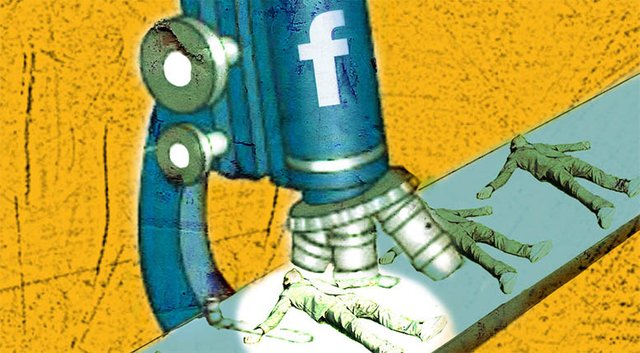Why Are We Still Using Facebook?

Facebook has acknowledged what multiple studies have already confirmed – the social network has a tendency to make users depressed, stressed, and envious.
After years of studies pointing to negative experiences for users of Facebook, the social media giant has finally conceded that users may experience periods of sadness or depression. “In general, when people spend a lot of time passively consuming information — reading but not interacting with people — they report feeling worse afterward,” Facebook wrote in a new blog post titled “Hard Questions: Is Spending Time on Social Media Bad for Us?”.
Facebook mentions a University of Michigan study titled “Passive Facebook usage undermines affective well-being: Experimental and longitudinal evidence.” In the study students were randomly assigned to read Facebook for ten minutes. The students who only scrolled reported feeling in a worse mood by the end of the day when compared to students who talked to friends and posted on Facebook. The blog post also mentions a study from UC San Diego and Yale which found that people who clicked on about four times as many links as the average person, or who liked twice as many posts, reported worse mental health than average in a survey.
The blog also notes that a study conducted by Facebook and Robert Kraut at Carnegie Mellon University found that people who sent or received more messages, comments and Timeline posts reported improvements in social support, depression and loneliness.
Simply broadcasting status updates wasn’t enough; people had to interact one-on-one with others in their network. Other peer-reviewed longitudinal research and experiments have found similar positive benefits between well-being and active engagement on Facebook.
Facebook concludes their post by stating that their research and the academic literature “suggests that it’s about how you use social media that matters when it comes to your well-being.” Interestingly, Facebook’s solution to negative emotional responses caused by too much Facebook is basically to use Facebook more often and in a more social manner. Facebook writes:
According to the research, it really comes down to how you use the technology. For example, on social media, you can passively scroll through posts, much like watching TV, or actively interact with friends — messaging and commenting on each other’s posts. Just like in person, interacting with people you care about can be beneficial, while simply watching others from the sidelines may make you feel worse.
Although Facebook is only now publicly discussing the effects of the social network being so heavily intertwined with billions of people’s lives, there have been studies examining the issue since at least 2013. Reuters UK reported that a group of researchers from the Institute of Information Systems at Berlin’s Humboldt University found that “one in three people felt worse after visiting the site and more dissatisfied with their lives, while people who browsed without contributing were affected the most.”
“We were surprised by how many people have a negative experience from Facebook with envy leaving them feeling lonely, frustrated or angry,” researcher Hanna Krasnova told Reuters.
According to a 2014 study published in Computers in Human Behavior, most users are not very social when using social media, choosing instead to passively consume information. The study, “Facebook’s emotional consequences: Why Facebook causes a decrease in mood and why people still use it,” found that this leaves users feeling unfulfilled and dissatisfied. Users experienced a decline in mood after spending time scrolling through Facebook. The mood decline was not prevalent during browsing the Internet in general. The researchers believe people leave Facebook feeling as if they wasted their time and this causes them to feel sad for being unproductive.
Another study published in the June 2016 issue of Current Opinion in Psychology found that Facebook contributes to envy of friends and could lead to depression. A February 2017 study, titled “Association of Facebook Use with Compromised Well-Being: A Longitudinal Study,” argues that using Facebook regularly can have a negative effect on a person’s well being. “Exposure to the carefully curated images from others’ lives leads to negative self-comparison, and the sheer quantity of social media interaction may detract from more meaningful real-life experiences,” the report says.
In the report “Seeing Everyone Else’s Highlight Reels: How Facebook Usage is Linked to Depressive Symptoms,” researchers investigated how social comparison to peers through Facebook interactions might impact users’ psychological health. The research provides evidence that people feel depressed after spending a large amount of time on Facebook. The problem was again attributed to comparing oneself to others.
Indeed, the concern over Facebook use was recently echoed by Sean Parker, Facebook’s first president. Parker was speaking at an Axios event at the National Constitution Center in Philadelphia when he discussed the origins and implications of Facebook:
“The thought process that went into building these applications, Facebook being the first of them … was all about: ‘How do we consume as much of your time and conscious attention as possible?’” Parker said.
“And that means that we need to sort of give you a little dopamine hit every once in a while, because someone liked or commented on a photo or a post or whatever,” he told Axios. “And that’s going to get you to contribute more content, and that’s going to get you … more likes and comments.”
Parker added: “It’s a social-validation feedback loop … exactly the kind of thing that a hacker like myself would come up with, because you’re exploiting a vulnerability in human psychology.”
“The inventors, creators — it’s me, it’s Mark Zuckerberg, it’s Kevin Systrom on Instagram, it’s all of these people — understood this consciously,” he said. “And we did it anyway.
As Aaron Kesel recently noted for Activist Post,
This is also not the first time Facebook has been outed for manipulating perception. In 2014 they were exposed for blatantly targeting human emotions in an experiment without their users’ knowledge:
[...]
Facebook revealed that it had manipulated the news feeds of over half a million randomly selected users to change the number of positive and negative posts they saw. It was part of a psychological study to examine how emotions can be spread on social media. (Source)
The implications of these studies should not be ignored. The world’s largest social network is already a partner of the U.S. government and maintains close relationships with intelligence agencies around the world. The fact that we also know the platform is harming us on an emotional, psychological, and possibly even spiritual level, should not be taken lightly.
Image credit: Anthony Freda Art
I am an investigative journalist and liberty activist; a Lead Investigative Reporter for ActivistPost.com and the founder of the TheConsciousResistance.com & The Houston Free Thinkers. I have also co-authored three books with @johnvibes: The Conscious Resistance: Reflections on Anarchy and Spirituality and Finding Freedom in an Age of Confusion, Vol. 1 and Finding Freedom in an Age of Confusion, Vol. 2
Donate via Bitcoin: 16fDdrZvt9XUv7TyboSYtaHfcxMb22Yiew
Donate via Ethereum: 0x8d20b442de44C28467b3d66939ff3077F9CfCb24
I am always available for interviews, Please contact [email protected]
I greatly appreciate any support here or on my other social media:

I spend more time on Steemit nowadays. I go to facebook to share my Steemit posts and see how my friends are doing.
That is me too. I keep the FB to promote Steemit and check for messages. My wall there has become so very thin now, not much in the way of real news being allowed either. Steemit simply gives me a better feeling all the way around. Good to meet you! Steem on...
Yes- Steemit is much better! My facebook feed and pages now are full of Steemit articles, news, videos, etc. Nice to meet you as well! Followed! :)
There is zero need for FB anymore, now that we have Steemit, Dtube, and Gab. Thanks for speaking out on this, @dbroze! 100% Upvoted and Resteemed!
Gab?
https://www.gab.ai It is a censorship free alternative to twitter. Check it out! It's awesome! People are leaving twitter in droves since they have started banning people and closing their accounts. There are multiple class action suits filed. Followed u!
Wow great sounds good cheers!
I highly recommend that people worried about this use news feed blockers on Facebook.
If you don't know what these are they're browser extensions that hide Facebook's general "news feed" so you can only write posts, send and receive instant messages, accept event invites, etc.
For most university students at least (which is what I can speak for) the latter features are pretty essential to day to day social life stuff, but by blocking the newsfeed you take away the bottomless scroll pit of addictive and exaggerated portrayals of people's lives.
That's a great recommendation! @kennyskitchen is always telling people about how he has simply un-followed every friend he has and page he's liked on FB, so that the "feed" column is always completely empty... but a browser extension seems like a much easier option for most folks.
I'd say it definitely kills relationships. Time spent together is divided into time spent checking the phone (mostly Facebook) and actively engaging with the person in front of you.
Yeah, I hate when other person draws his phone when talking to me.
Great comment. Upvoted and followed ya'....But, there's one problem... Go Red Sox! Fenway all the way, baby!
The problem is that some of these finding transfer to any social network usage, and you can include Steemit in that. It would be interesting to see what the difference is in social media usage and whether or not a completely alternative social media like Steemit has any balancing qualities. I hazard that it is not completely without it's similar downsides.
That is quite true. There is something to be said for the desire to find social interaction through a computer screen, and not in physicality, as well as the whole "scrolling your feed" issue. Certainly, options like Steemit are better in some ways, like the lack of targeting algorithms (your feed is just posts of the people you follow, in chronological order) the lack of advertising and "news" all around the sides of your screen, and the generally higher quality of content and more authenticity of communication here.
Oh man I feel WAYYY better using Steemit than FB. I see creators! I can follow them and actually see their posts! Facebook USED to make me feel amazing, now, it makes me depressed almost instantly. I used to spend 3-4 hours a day replying to messages and comments I got about my art. NOw I rarely get ANY notifications or messages about my art, and the ones I do get are from the same 3 people
The effect on mood is clear. But Facebook still plays its role in connecting people. For me, it is far easier to write a message to a friend 10km away than to phone him. I also modified my feed, so I have opinions of most good politicians at one place and don't need to rely on news to report on it. Informational value of some pages is like of gold.
It is true that Facebook may emotionally hurt you. It all depends on how you use it.
I for one, only keep using Facebook because content creators I appreciate still stay there, though I hardly post anything anymore over there. I hate Facebook for collecting information on their users but we had no other option until not very long ago.
Decentralized social networks are the future, and are better for all users.
Upvoted! As soon as Steemit gets Direct Messaging, it's over for the other social media networks.
Very interesting post. Since I became active on Steemit, I am barely on FB at all and perhaps I'll be able to wind that down completely soon.